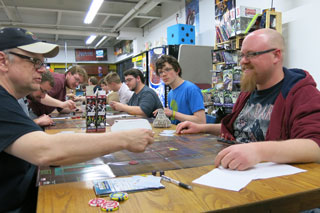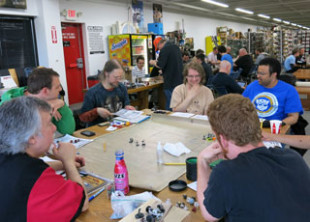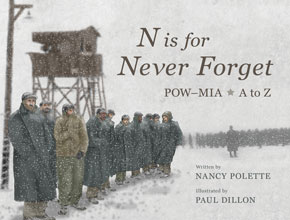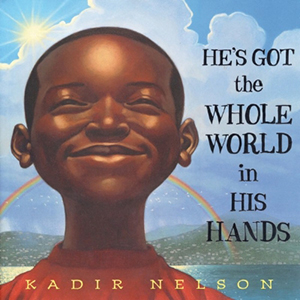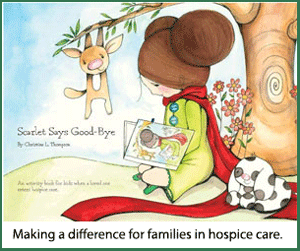The local neighborhood comic book store bustles with customers, the staff busy helping people purchase comic books and games. In the back of the store, 60 or 70 people sit around tables with game boards and game pieces. Bursts of laughter and general chatter confirm everyone is having a good time.
The crowd gathered here at Source Comics & Games, in St. Paul, Minnesota, is a snapshot of the greater comic book community. This night, it’s mostly men in their twenties and thirties, with some kids, women, and gray-haired people as well. It’s a lively, energetic group, passionate about comics and the character worlds within.
“It’s a very open and welcoming environment,” says J.T. Thomas, a cashier at Source. “Comics [culture] is a bit special because it’s inclusive.”
Like many of the people at this comic book store, J.T. proudly calls himself a geek. He says geeks are “labeling themselves as part of a larger group.”
Although the majority of customers are male, J.T. says his female friends feel welcome, too. He says the “spirit of geekdom” is passionate, welcoming, and open. The people at the store, and within the comics and gaming community, are more than just acquaintances.
For the past twenty-two years, Source Comics has been a second home. J.T. was introduced to comic books and the comic book store when he was eight years old. His father bought him Simpsons comic books because his mom wouldn’t let him watch the show, he says. When J.T. was still young, his father passed away. Nick and Bob, two of the owners of Source Comics, became like fathers to J.T. The customers at the store became like family.
J.T. admits that the comic book community has a dark side, sometimes pigeon holed as “sex-obsessed, fat, angry guys who are dismissive of women and minorities.” The stereotype isn’t entirely off the mark. Violence against women in comic books, as well as a lack of racial diversity portrayed in leading characters, is a reality.
J. T. believes the comic book world is getting better, but still has a long way to go. Minorities are often tokenized as minor characters or splashed across magazine covers. He hopes to see diversity become less of an “editorial initiative” and more of a movement. “If you’re not going to have more diverse writers and artists, who even cares?” he asks.
Sitting off to the side, sewing a large black pirate flag, is Bryan Maus—lifelong comic book fan. The pirate flag is for the costume he’ll wear as a street character at the Minnesota Renaissance Festival in August. Bryan isn’t your casual comic book reader. He has thousands of comic books, stored carefully in plastic sleeves in large boxes at home.
“I think comic books get a bum rap. People think, oh it’s just the pictures. There’s nothing special here. But the stories they write are solid, sometimes heart-wrenching stories. And the pictures, they kind of add to that,” he says.
J.T. agrees with Bryan. “The creators of these books are able to craft a meaningful narrative, and should be critically acclaimed like other books or films.”
Bryan will join his friends in a role playing game later in the evening. As with comic books, role playing games (RPGs) spur the creative imagination, he says. RPGs allow players to imagine themselves as a character from a book and explore elements of a character or story that inspire them, he says.
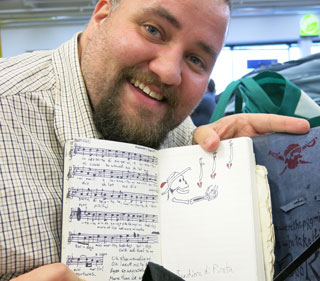
Bryan says role playing allows readers to explore comic book characters or stories that inspire them.
“Say there’s a character in a book you like. You can role play a similar character and feel what it might be like to be in Conan’s boots … but with the safety of not actually slaughtering people or doing naughty things,” Bryan says, grinning.
Bryan started reading comic books and playing role playing games as a kid. It became a way to develop his theatrical skills and has turned into a lifetime hobby.
“Role playing games can be done for a variety of reasons.” Bryan explains, “It allows you to get out of your shell a little bit. You’re basically sitting there around a table, not physically reenacting things, but you’re taking on the persona of the character.” He adds: it’s also a cathartic release, for those who spend much of their day in a cubicle, like he does.
Across the room is a long table filled with guys playing Hero Clix, a role playing game using miniature figures depicting characters from books that encounter various challenges and scenarios as set out by the game master. Hero Clix is like chess, but instead of six different pieces there are up to a thousand different pieces. Each game piece moves differently and has different abilities and point values. This tournament is using miniatures from the Marvel and DC Comics universes.
“Definitely what gets people into the game is the characters and the books,” says Zach Zinnel, who has been coming to this comic book store almost every Wednesday night since 1996.
Jerry, who acquiesced to sharing his first name after first requesting to be called “Dr. Bong,” a super villain in Marvel Comics, is running the tournament. He’s been running RPG tournaments for eleven years in a variety of locations. Jerry says comic books are beneficial for reading comprehension, imagination, and creativity.
“[Comic book stores] give a forum for social activity,” says Jerry. “Where, normally—I hate to degrade my kinsmen, but—some of these guys wouldn’t leave the house. Give them an atmosphere like this, and they’ll come out and play.”
At the recent national Free Comic Book Day, Source Comics had 5,000 people stop by. The line went out the door, around the building, and down a couple of city blocks.
“It gets the community together,” Jerry says with a smile.
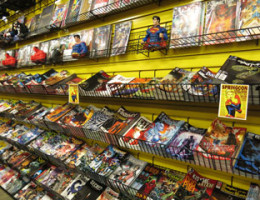 Source Comics & Games
Source Comics & Games
Web: www.SourceComicsAndGames.com
Twitter: @SourceCandG
Photos of Source Comics & Games community by Naomi Krueger.
Naomi Krueger is a freelance writer and interim managing editor of Books Make a Difference. To contact Naomi or read her blog, visit www.NaomiKrueger.com.

